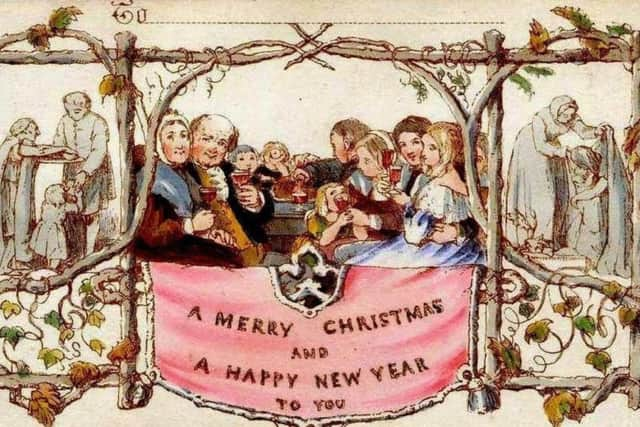Christmas cards sending wrong message about harmful drinking, warn experts
and live on Freeview channel 276
Tracey Polak, assistant director of public health, and Virginia Pearson, chief officer for communities, public health, environment and prosperity at Devon County Council say these cards “influence views on drinking and reinforce this as a social norm”.
And with the UK buying more cards per person than any other nation (an average of 33 each a year) they urge the public to reflect on whether the message is one that they condone and wish to pass on.
Advertisement
Hide AdAdvertisement
Hide AdSir Henry Cole is widely credited with “inventing” the first Christmas card in the UK in 1843, depicting a scene showing people drinking.


In 1980, an analysis of greeting cards revealed themes that suggested getting drunk is a natural and desirable concomitant of celebrations, and drunkenness is humorous, enjoyable, and harmless.
Today, one billion greeting cards are sold in the UK annually, and alcohol remains a popular theme.
Illustrations and texts portray alcohol as enjoyable and fun, and can range from a glass of champagne with the word “Cheers” to those that are more excessive and encourage binge drinking, explain the authors.
Advertisement
Hide AdAdvertisement
Hide AdPhrases such as “let’s get wrecked”, “all the gin” and “trollied” are printed across images of people clearly drunk, surrounded by empty bottles, drinking directly from a bottle, or in some case unconscious.
But the idea excess drinking as shown on many greeting cards cards is normal, enjoyable and to be encouraged is at variance with public health messages, they argue. They point out that more than ten million people in the UK are drinking at levels which increase their risk of harm, and alcohol consumption is the leading risk factor for ill-health, early death and disability in those aged 15 to 49. As the card market adapts and produces new themes, they say it is worth considering whether it influences societal views or whether societal views influence the card market.
The authors said: “As cards with alcohol themes become more prevalent, then a cultural norm develops where drinking in association with celebration becomes the expected.”
And while manufacturers are unlikely to respond to public health lobbying to depict more responsible drinking, “they may change what they produce if consumers choose not to buy cards depicting irresponsible drinking”.
Advertisement
Hide AdAdvertisement
Hide AdAlison Douglas, chief executive of Alcohol Focus Scotland, said: “Whether it’s Christmas, birthdays or other celebrations the shops are full of gimmicky gifts and cards that encourage us to reward ourselves with a drink.
“These products reinforce the idea that drinking to excess is normal and fun, but the high number of alcohol related hospitalisations and deaths in Scotland tell a different story.
“The recently launched #dontpinkmydrink campaign highlights the way alcohol producers and retailers link alcohol to women’s friendships, feminism and empowerment. The campaign is a positive way for us to call out alcohol producers and retailers and tell them we won’t endorse their products.”